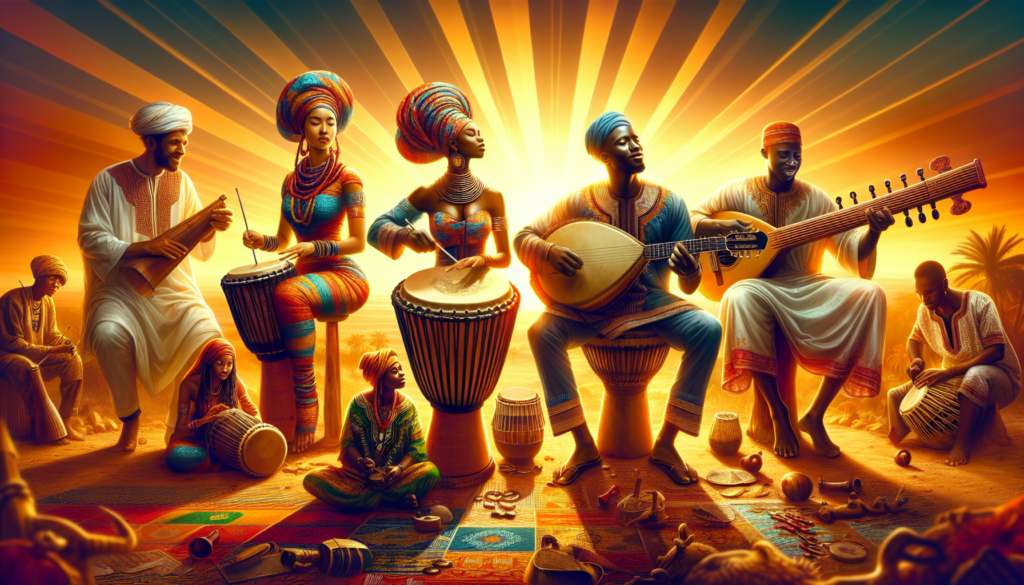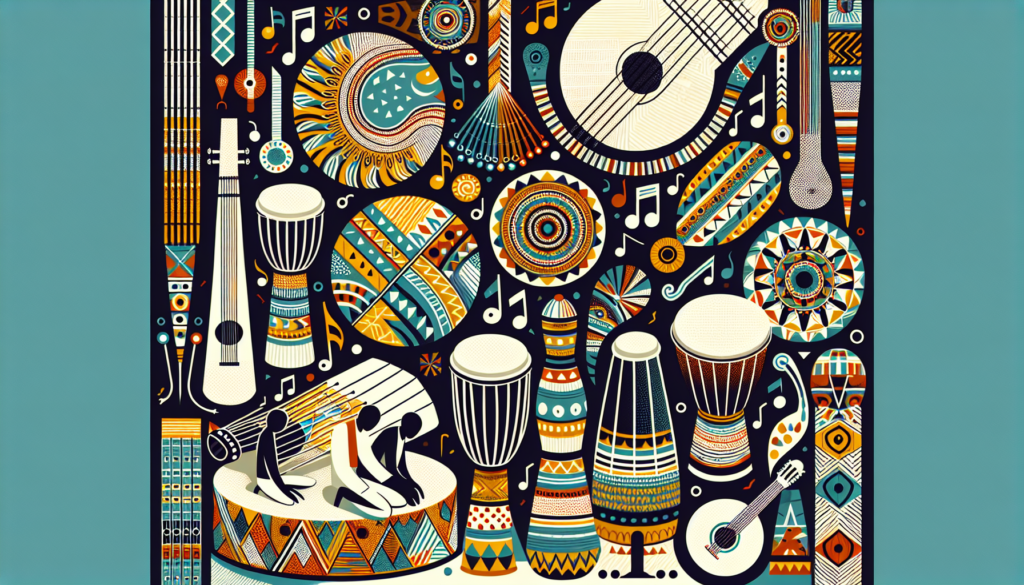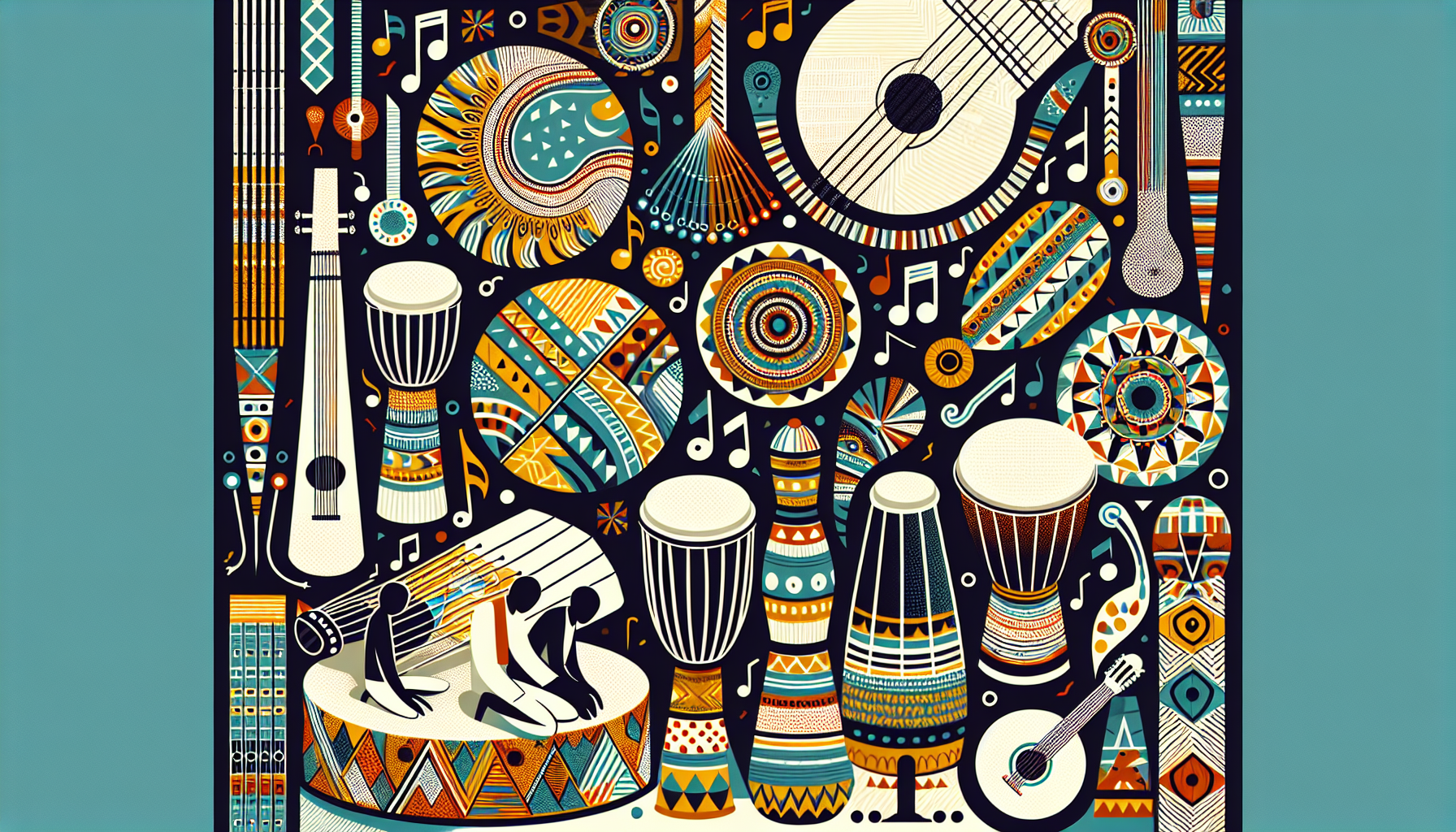Have you ever wondered about the vibrant rhythms and captivating melodies of West African music? In this article, get ready to embark on a journey of musical exploration as you discover the rich and diverse sounds that emanate from this enchanting region. From the infectious beats of Afrobeat to the soul-stirring melodies of Highlife, you’ll uncover the hidden gems of West African music that have influenced artists worldwide. So grab your headphones and join us as we delve into the captivating world of the local music scene in West Africa.

History of West African Music
Traditional Music
West African music has a rich and vibrant history that dates back centuries. Traditional music in this region is deeply rooted in cultural and spiritual practices, reflecting the diversity and heritage of the various ethnic groups found throughout West Africa. Traditional West African music utilizes a wide range of musical instruments, rhythms, and vocal techniques to tell stories, convey emotions, and connect with the spirit world. From mesmerizing kora melodies to the rhythmic beats of the talking drum, the traditional music of West Africa is a true reflection of the region’s cultural identity.
Colonial Influence
The arrival of European colonizers in the 15th century had a significant impact on the music of West Africa. As the transatlantic slave trade grew, African musical traditions became intertwined with European influences, leading to the emergence of various hybrid musical styles. European musical instruments such as the piano, guitar, and accordion were introduced to West Africa, creating new possibilities for musical expression. This fusion of African and European musical elements laid the foundation for the vibrant music scene that exists in West Africa today.
Independence Era
The mid-20th century marked a period of political change and independence movements throughout West Africa. This era also brought about a cultural renaissance, as musicians played a crucial role in voicing the aspirations and struggles of their people. Mixing traditional sounds with modern instrumentation and recording techniques, West African musicians began to create unique and powerful music that reflected their collective experiences and desire for freedom. This period saw the rise of iconic musicians who would go on to shape the future of West African music.
Modern Day
Today, West African music continues to evolve and thrive, embracing contemporary influences while staying rooted in its rich cultural heritage. Artists from the region have gained global recognition for their innovative and infectious sounds, and West African genres such as Afrobeat and Highlife have transcended borders, captivating audiences worldwide. The advent of technology and digital platforms has further amplified the reach of West African music, allowing artists to connect with fans on a global scale. The modern music scene in West Africa is a vibrant tapestry of genres and styles, where tradition and innovation coexist harmoniously.
Traditional West African Instruments
Kora
The kora is a mesmerizing string instrument considered to be the most iconic in West Africa. With its distinct sound and intricate design, the kora is central to the music and culture of the Manding people, who inhabit regions such as Gambia, Senegal, and Mali. This beautiful instrument consists of a large gourd resonator covered with cowhide and a neck with 21 strings made of fishing line. The kora is traditionally played by griots, who are musicians and oral historians, and its delicate, melodic tones can transport listeners to another world.
Balafon
The balafon is a xylophone-like instrument commonly found in West Africa. It consists of wooden bars of various sizes, arranged in a specific sequence and played using mallets. The balafon’s vibrant and percussive sound brings joy and energy to traditional West African music. Each balafon has its own unique tuning, and the instrument is often associated with storytelling and cultural ceremonies. From Mali to Guinea, the balafon plays a vital role in West African musical traditions, connecting communities through rhythm and melody.
Talking Drum
The talking drum, also known as the dundun or tamani, is a drum-shaped instrument with a tensioned membrane that can be squeezed to change the pitch while playing. This unique feature allows the talking drum to imitate the tonal patterns of human speech, earning it its name. Traditionally used by griots to convey messages, stories, and announcements, the talking drum is an integral part of West African music. Its rhythmic patterns, combined with skilled drumming and the use of the drumhead to modulate the sound, create a captivating and expressive musical experience.
Djembe
The djembe is a versatile and widely recognized drum originating from West Africa. It is carved from a single piece of hardwood and traditionally covered with goat or cow skin. The shape and materials of the djembe produce a wide range of tones, from deep bass to sharp slaps, making it a highly expressive instrument. With its infectious rhythms and ability to engage the audience, the djembe has become popular not only in traditional West African music but also in various global music genres.
Ngoni
The ngoni is a string instrument that resembles a small lute or guitar. It is widely played across West Africa, particularly in Mali, Senegal, and Burkina Faso. The ngoni has a calabash or wooden resonator covered with animal skin, and it typically has four, six, or seven strings. Its rhythmic and percussive sound adds depth to the music, and skilled ngoni players can create intricate melodies and captivating rhythms. The ngoni is often associated with griots and is an important instrument in storytelling and preserving the cultural heritage of West African communities.
Genres of West African Music
Afrobeat
Afrobeat originated in Nigeria in the 1960s and was popularized by the legendary musician Fela Kuti. Combining traditional African rhythms with elements of jazz, funk, and highlife, Afrobeat became a powerful and politically charged genre. Its infectious rhythms and socially conscious lyrics spoke to the experiences and struggles of ordinary people. Afrobeat continues to thrive today, with contemporary artists building upon its foundations and infusing it with new sounds and influences.
Highlife
Highlife is a genre that originated in Ghana in the early 20th century. It developed as a fusion of traditional West African rhythms, European military brass band music, and Caribbean influences. Highlife is characterized by its lively melodies, rhythmic guitar patterns, and rich vocal harmonies. Over the years, highlife has evolved and incorporated elements of jazz, funk, and other genres, becoming a staple of West African music.
Juju
Juju music is a popular genre from Nigeria that emerged in the 1920s. It combines elements of traditional Yoruba music with Western instruments and influences, creating a unique sound that is both modern and rooted in tradition. Juju music often features intricate guitar work, call-and-response vocals, and energetic rhythms. It is known for its ability to uplift and entertain, making it a favorite at social gatherings and parties.
Griot Music
Griot music is the musical tradition of the griots, who are hereditary musicians and storytellers in West Africa. Griots hold a central role in preserving the history, genealogy, and cultural traditions of their communities through music. Griot music often features the kora, balafon, and other traditional instruments, with the musicians accompanying their songs with storytelling and oral history. This genre serves as a means of passing down knowledge and maintaining the cultural fabric of West African societies.
Mbalax
Mbalax is a high-energy genre that originated in Senegal in the 1970s. It blends traditional West African rhythms and instruments with Western influences such as jazz, rock, and soul. Mbalax is characterized by its rhythmic complexity, energetic drumming, and powerful vocals. The genre rose to international prominence with artists like Youssou N’Dour, who helped popularize the vibrant and infectious sound of Mbalax beyond the borders of Senegal.
Influence of West African Music on Other Parts of the World
Introduction to the Americas
The transatlantic slave trade brought West African music to the Americas, where it played a crucial role in the development of various music genres. The rhythms, melodies, and instruments of West African music influenced the creation of genres such as blues, jazz, reggae, and Afro-Cuban music. The African diaspora brought a rich musical heritage that continues to resonate in the vibrant music scenes of the Americas.
Jazz and Blues
The influence of West African music on jazz and blues cannot be overstated. The rhythmic complexity, improvisation, and call-and-response elements found in West African music laid the foundation for these genres. Artists like Louis Armstrong and Duke Ellington incorporated African musical elements into their compositions, helping shape the sound of jazz. Blues, with its soulful melodies and expressive vocals, owes its roots to the call-and-response traditions of West African music.
Reggae and Ska
Reggae and ska, popular genres in Jamaica, were heavily influenced by West African music. The syncopated rhythms, offbeat guitars, and the use of the drum as a rhythmic and melodic instrument are all characteristics borrowed from West African musical traditions. Reggae legends such as Bob Marley and Peter Tosh drew inspiration from West African music, infusing their songs with messages of liberation and social justice.
Hip Hop and Afrobeat Fusion
In recent years, the fusion of hip hop and Afrobeat has gained popularity, bridging the musical traditions of West Africa and the African diaspora. Artists like WizKid, Burna Boy, and Davido have collaborated with American hip hop artists, blending infectious Afrobeat rhythms with rap lyrics. This fusion not only showcases the global impact of West African music but also serves as a celebration of the shared cultural heritage between Africa and its diaspora.

Famous West African Musicians
Fela Kuti
Fela Kuti, often referred to as the “King of Afrobeat,” was a Nigerian musician and political activist. His innovative approach to music, blending traditional African rhythms with jazz and funk, created the genre of Afrobeat. Fela Kuti’s music was a powerful tool for social and political commentary, addressing corruption, oppression, and inequality. His legacy as a musical and political icon continues to inspire generations of artists worldwide.
Miriam Makeba
Miriam Makeba, also known as “Mama Africa,” was a South African singer and activist. Her soulful voice and powerful lyrics brought international attention to the struggles of apartheid in South Africa. Makeba’s music celebrated African culture and heritage, and she became a symbol of resistance and hope. Through her music, Miriam Makeba opened doors for African artists globally and left a lasting impact on the music scene.
Salif Keita
Salif Keita, hailing from Mali, is known for his distinctive voice and unique blend of traditional West African music with modern influences. His music carries deep emotional resonance and speaks to the experiences of marginalized communities. Keita’s work transcends borders and genres, creating a harmonious fusion that has garnered him international acclaim. He is celebrated as one of Africa’s most influential musicians of our time.
Youssou N’Dour
Youssou N’Dour, a Senegalese singer, songwriter, and politician, is often referred to as the “Voice of Africa.” With his powerful voice and charismatic stage presence, N’Dour brought Senegalese music to the global stage. He played a pivotal role in popularizing Mbalax music and infusing it with a modern sound. Youssou N’Dour’s music transcends language barriers, connecting people from all walks of life through the universal language of music.
Angelique Kidjo
Angelique Kidjo, a Beninese singer-songwriter, is recognized for her powerful vocals and ability to fuse various musical genres. She draws inspiration from traditional West African rhythms, highlife, jazz, and funk, creating a unique sound that defies categorization. Kidjo’s music often carries uplifting and empowering messages, promoting social and environmental justice. Her artistry and global impact have made her one of Africa’s most celebrated musicians.
Traditional Music Festivals in West Africa
Festival Sur le Niger (Mali)
The Festival Sur le Niger, held annually in Ségou, Mali, celebrates the cultural heritage of the Niger River. The festival showcases diverse West African music styles, from traditional to contemporary, inviting both local and international artists to perform. Festival-goers can immerse themselves in the vibrant music, dance, and art exhibitions, fostering cultural exchange and appreciation.
Felabration (Nigeria)
Felabration is an annual music festival held in Lagos, Nigeria, to honor and celebrate the life and legacy of Fela Kuti. The week-long festival features performances by a multitude of local and international artists, paying homage to the influential musician and the Afrobeat genre. Felabration captures the spirit of Fela Kuti’s music and serves as a platform to promote social activism, human rights, and African unity.
The Grand Magal of Touba (Senegal)
The Grand Magal of Touba is an annual religious pilgrimage and cultural festival held in Touba, Senegal. This event brings together millions of followers of the Mouride Brotherhood, a Sufi Islamic order. Devotees celebrate through music, dance, and prayer, with griots playing a central role in performing traditional songs and eulogies. The festival exemplifies the fusion of spirituality and music, creating a powerful and transformative experience for participants.
Boukoutaya (Guinea)
Boukoutaya is a traditional music festival held in Guinea, known for its vibrant performances and colorful costumes. Musicians, griots, and dancers gather to showcase traditional music and dance styles from various ethnic groups in the country. Boukoutaya provides a platform for cultural exchange and preservation of Guinea’s rich musical heritage.
Traditional Dances of West Africa
Ewe Dance (Ghana/Togo)
Ewe dance is a vibrant and energetic traditional dance style that originated from the Ewe people of Ghana and Togo. It is characterized by its rhythmic footwork, complex body movements, and synchronized group choreography. Ewe dance is often accompanied by live drumming and singing, setting the stage for joyful celebrations, cultural ceremonies, and storytelling.
Kuku Dance (Nigeria)
The Kuku dance, originating from the Yoruba people of Nigeria, is a sacred and ceremonial dance performed during important occasions such as weddings and festivals. Dancers showcase intricate footwork and stylized movements to the rhythm of the drums, invoking spiritual energy and creating a sense of unity among participants. The Kuku dance serves as a visual representation of Yoruba cultural traditions and beliefs.
Sabar Dance (Senegal)
The Sabar dance, rooted in the cultural traditions of Senegal’s Wolof people, is characterized by its energetic and rhythmic movements. Dancers display their agility and grace while responding to the polyrhythmic beats of the sabar drums. Sabar dance is often performed during traditional ceremonies, cultural gatherings, and celebratory events, showcasing the vibrant and dynamic spirit of Senegalese culture.
Koroso Dance (Mali)
Koroso is a traditional dance style originating from the Bambara people of Mali. It is performed to honor ancient gods and ancestral spirits. Dancers, adorned in colorful attire, move with elegance and precision, accompanied by live drumming and vocal chants. The Koroso dance carries deep spiritual significance, connecting participants to their cultural heritage and providing a space for communal celebration.
Modern Music Scenes in West Africa
Pop and Afrobeat
The West African music scene has seen a rise in pop music, which blends elements of traditional West African music with contemporary sounds. Artists like Davido, Tiwa Savage, and WizKid have gained international recognition, captivating audiences with catchy melodies and infectious rhythms. Afrobeat, a genre that originated in Nigeria, continues to dominate the modern music scene, fusing traditional rhythms with influences from hip hop, R&B, and dancehall.
Hip Hop
Hip hop has become a prominent force in West African music, with artists using the genre to express their creativity and address social and political issues. From Nigeria to Ghana, hip hop artists such as Sarkodie, M.I Abaga, and Burna Boy have gained popularity for their lyrical prowess and ability to connect with the youth. West African hip hop incorporates local languages, storytelling, and cultural references, creating a unique and authentic expression of contemporary African experiences.
Reggae and Dancehall
Reggae and dancehall have found a home in West Africa, with artists like Patoranking and Stonebwoy infusing their music with local flavors. The reggae and dancehall scenes in countries like Nigeria, Ghana, and Senegal showcase the influence of Jamaican music while incorporating indigenous sounds and themes. West African reggae and dancehall artists use their music as a platform to promote social awareness, unity, and cultural pride.
Electronic Music
Electronic music has gained traction in West Africa, with artists blending traditional rhythms and instruments with modern production techniques. This fusion creates an innovative and unique sound that appeals to a global audience. Artists like Nubiyan Twist and Ata Kak traverse the boundaries of electronic music while staying true to their West African roots, providing a fresh perspective on the region’s musical landscape.
Role of Music in West African Society
Storytelling and Oral Tradition
Music plays a significant role in preserving and passing on cultural traditions and stories in West African society. Griots, the traditional storytellers and musicians, use music and oral history to recount historical events, preserve genealogies, and convey moral lessons. By incorporating music into their narratives, griots help shape West African identity and ensure the continuity of cultural knowledge for future generations.
Celebrations and Rituals
Music is an integral part of celebrations and rituals in West African society. From weddings to harvest festivals, music sets the tone for these joyous occasions. The rhythmic beats, soulful melodies, and energetic dances create a sense of unity and bring communities together. Music serves as a powerful tool for expressing joy, expressing gratitude, and fostering social connections.
Social and Political Commentary
West African musicians have a long history of using music as a platform for social and political commentary. From Fela Kuti’s activism to contemporary artists addressing issues of inequality and corruption, music serves as a means to raise awareness and provoke thought. Through their lyrics and performances, West African musicians amplify the voices of the marginalized and fight for social justice, making music a powerful force for change.
Preservation and Promotion of West African Music
Local Initiatives and Cultural Centers
Numerous local initiatives and cultural centers in West Africa actively work to preserve and promote traditional music. These organizations provide platforms for musicians to showcase their talent, offer music education programs, and support the production and distribution of local music. By fostering a supportive environment for artists and connecting them with local and international audiences, these initiatives play a crucial role in preserving West African music.
International Collaboration and Music Exchanges
International collaboration and music exchanges have become increasingly important in promoting West African music on a global scale. Musicians from West Africa engage in cultural exchanges, collaborating with artists from different parts of the world. This exchange of ideas and musical influences enriches the West African music scene and allows artists to reach new audiences. International festivals and events also provide opportunities for West African musicians to share their music with diverse and global audiences.
Digital Platforms and Streaming Services
The advent of technology and digital platforms has revolutionized the way West African music is accessed and shared. Streaming services, social media platforms, and online music stores have made it easier for musicians to distribute their music and connect with fans around the world. The digital era has also given rise to online communities dedicated to West African music, allowing enthusiasts to discover, share, and celebrate the rich musical traditions of the region.
In conclusion, West African music has a rich history that encompasses traditional practices, colonial influences, and the spirit of independence. The diverse array of traditional instruments, such as the kora, balafon, talking drum, djembe, and ngoni, all contribute to the unique sounds of West African music. Genres such as Afrobeat, Highlife, Juju, Griot Music, and Mbalax have shaped the musical landscape of the region and influenced musical genres worldwide. The music of West Africa has also had a significant impact on other parts of the world, from the Americas to Europe, with traces of West African music evident in jazz, blues, reggae, and hip hop.
Famous West African musicians like Fela Kuti, Miriam Makeba, Salif Keita, Youssou N’Dour, and Angelique Kidjo have inspired generations with their music. Traditional music festivals, dances, and the modern music scene continue to thrive in West Africa, providing platforms for cultural exchange, celebration, and artistic expression.
Music in West African society fulfills multiple roles, from storytelling and preserving oral tradition to providing a voice for social and political commentary. Efforts to preserve and promote West African music are driven by local initiatives, cultural centers, international collaborations, and digital platforms. Through these means, the vibrant and diverse music of West Africa continues to captivate audiences and bridge cultures.

